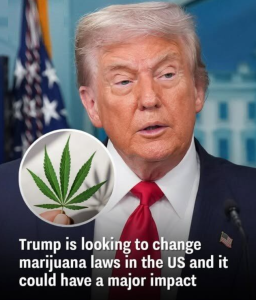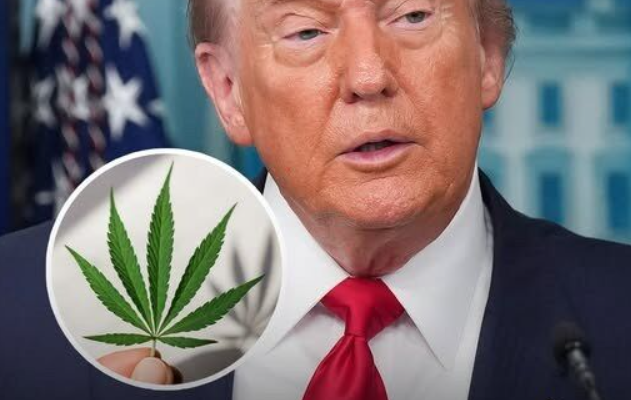A Historic Shift? U.S. Federal Government Considers Reclassification of Cannabis Amid Growing Calls for Reform
For decades, cannabis has been one of the most controversial topics in American politics. From its demonization in the early 20th century to its classification as a Schedule I drug under the Controlled Substances Act of 1970—placing it alongside heroin and LSD—cannabis has carried a stigma that has shaped laws, culture, and public perception. But today, momentum is building in a way that could mark a historic turning point. The U.S. federal government is actively considering reclassifying cannabis, a move that could have sweeping implications for health policy, the justice system, and the economy.
The Current Status
Under federal law, cannabis remains illegal and tightly regulated as a Schedule I drug. This means that, in the eyes of the federal government, it has “no currently accepted medical use” and a “high potential for abuse.” However, this classification increasingly conflicts with state-level reforms. As of 2025, 38 states and Washington, D.C. allow some form of legal medical marijuana, while 24 states have legalized recreational use.
This patchwork approach has created tension. In states like Colorado, California, and Michigan, cannabis businesses operate openly, generating billions in tax revenue. Meanwhile, under federal law, those same businesses face challenges like restricted banking access, limited research opportunities, and the ever-present risk of federal crackdowns.
Why Reclassification Matters
Reclassifying cannabis—even moving it from Schedule I to Schedule III—would not make it fully legal nationwide, but it would have enormous consequences:
-
Medical Research Expansion – Researchers currently face major hurdles when studying cannabis due to its Schedule I status. Reclassification would open the door for broader clinical trials, leading to clearer medical guidelines and potentially FDA-approved cannabis-based treatments.
-
Business and Banking Access – Cannabis companies today often operate in cash because major banks avoid dealing with them, fearing federal penalties. Rescheduling could ease restrictions, allowing businesses access to loans, credit, and safer financial systems.
-
Tax Relief – Right now, cannabis businesses cannot deduct ordinary expenses because of Section 280E of the tax code, which applies to Schedule I and II drugs. Moving to Schedule III would lift this burden, potentially transforming the industry’s profitability.
-
Public Perception – The symbolism of reclassification cannot be overstated. For decades, federal law has labeled cannabis as one of the “most dangerous substances.” A change would signal that the government is acknowledging medical value and shifting away from a punitive mindset.
Voices for Change
Support for reform has grown dramatically across the political spectrum. Polls show that nearly 70% of Americans support legalization, including a majority of Republicans. Advocates argue that criminalization has disproportionately harmed communities of color, fueling mass incarceration without reducing substance abuse.
Civil rights groups, medical professionals, and even veterans’ organizations have called for reform. Many veterans, for instance, advocate for cannabis as an alternative to opioids in managing chronic pain and PTSD, but VA doctors are restricted from prescribing or even recommending it.
Even within Congress, momentum is building. Bills like the MORE Act (Marijuana Opportunity Reinvestment and Expungement Act) and the SAFE Banking Act have garnered bipartisan support, though they’ve stalled in the Senate. Still, pressure on the federal government continues to grow.
The Opposition
Despite shifting attitudes, not everyone supports reclassification. Some law enforcement organizations argue that easing restrictions could complicate policing, particularly around impaired driving. Others fear that it could encourage use among adolescents or lead to increased public health costs.
Pharmaceutical companies have also lobbied against widespread cannabis legalization in the past, worried about competition with existing medications. Public health advocates remain cautious, urging that any reform be accompanied by clear regulations, education, and research on long-term effects.
A Political Flashpoint
President Joe Biden’s administration has already taken steps signaling a shift. In 2022, Biden pardoned thousands of people convicted of simple marijuana possession under federal law and urged governors to do the same at the state level. He also directed the Department of Health and Human Services (HHS) and the Department of Justice (DOJ) to review cannabis’s classification.
In late 2023, HHS recommended that cannabis be moved to Schedule III, citing evidence of medical use and lower abuse potential than other drugs currently listed in the same category. The DEA, however, has the final say—and their decision will determine whether the U.S. takes this historic step.
For the Biden administration, reclassification could be a political win ahead of elections, appealing to younger voters and progressive activists. But it also carries risks, as opponents could frame it as being “soft on drugs.”
Economic Stakes
The U.S. cannabis industry is already massive. In 2024 alone, legal cannabis sales topped $33 billion, with projections suggesting the market could surpass $50 billion by the end of the decade if federal barriers ease. States with legal cannabis have collected billions in tax revenue, funding schools, infrastructure, and social programs.
Rescheduling could accelerate growth, attracting more investors and entrepreneurs. It would also reduce the federal-state conflict that leaves many businesses vulnerable. However, full legalization and interstate commerce would likely require further congressional action beyond rescheduling.
Criminal Justice Impact
Perhaps the most profound consequence could be in the realm of justice. Over 600,000 people are arrested annually in the U.S. for marijuana-related offenses, most of them for simple possession. While some states have implemented expungement programs, federal reclassification could spark broader efforts to clear records, reduce sentences, and address decades of disproportionate enforcement in minority communities.
Activists stress that reform must not only change laws going forward but also repair the harm already done. For them, reclassification is only one piece of a much larger puzzle.
The Road Ahead
The DEA’s review process is still underway, and no timeline has been confirmed. Even if cannabis is reclassified, the work will not be over. Policymakers will need to establish guidelines for medical use, address gaps in state and federal law, and prepare for a rapidly evolving industry.
Still, the significance of this moment cannot be ignored. After more than half a century of prohibition and punishment, the federal government is on the brink of recognizing what millions of Americans already know—that cannabis is not the menace it was once portrayed to be.
Conclusion
Whether one views cannabis as a medical miracle, a recreational choice, or a public health concern, there is no denying that the debate has reached a tipping point. Reclassification would not mean total legalization, but it would mark a historic shift—one that reflects science, public opinion, and a growing acknowledgment of past mistakes.
For many, this moment represents more than a policy change. It is a step toward justice, modernization, and alignment between federal law and the reality on the ground. The question now is not whether cannabis reform will happen, but how far and how fast it will go.


